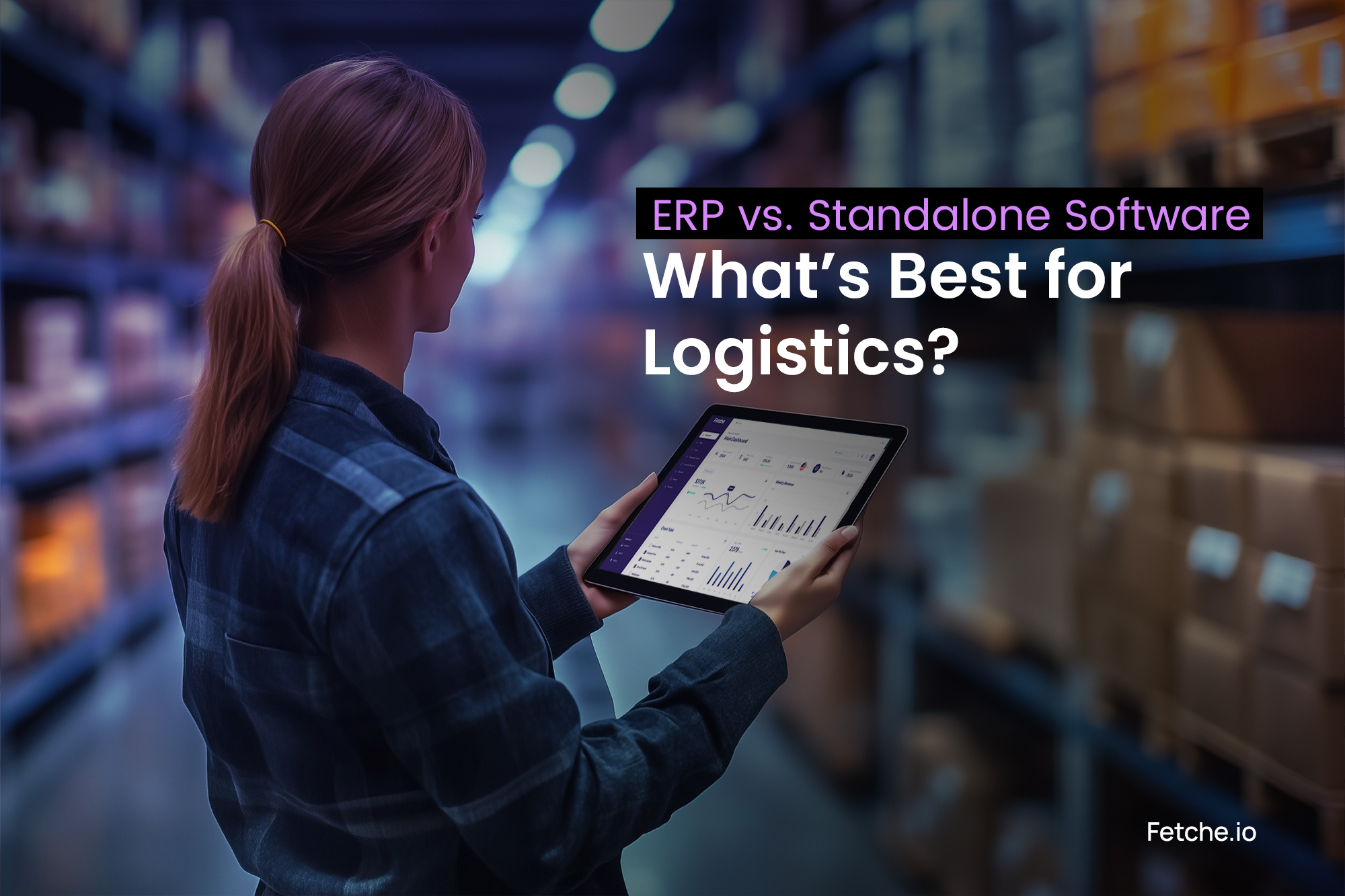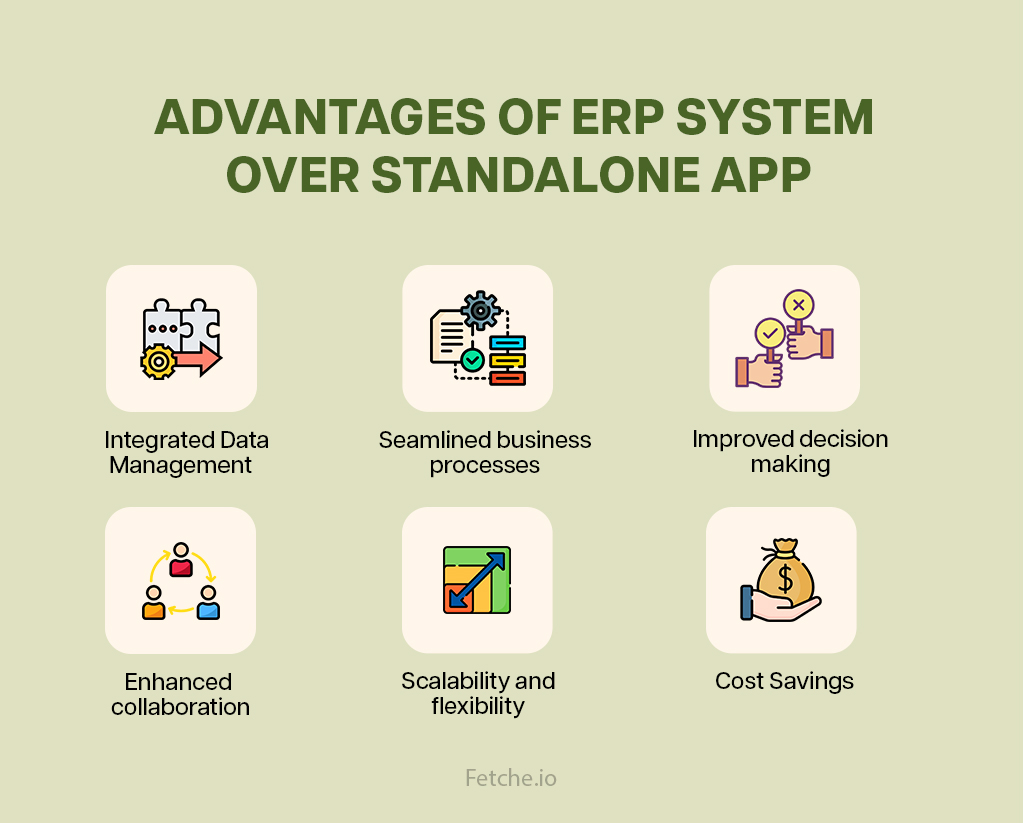
Are you stuck in that all-too-familiar dilemma of choosing between an ERP system and standalone software as your logistics management software? Yeah, we’ve all been there. On one hand, you’ve got the “all-in-one” ERP, and on the other, the specialized standalone tools. Picking the right one can feel like trying to choose between speed and comfort on a bumpy road—very tricky, but never mind, what if I say you have a shortcut in front of you to choose between the two or simply neglect the dilemma and simply reroute the whole scenario? What say?
What’s an ERP System, and Why Should You Care?
First off, ERP (Enterprise Resource Planning) systems are like the all-inclusive package deals of logistics management software. Cool, isn’t it? Instead of choosing logistics software or any other lightweight software separately or specialized logistics tools for inventory, fleet tracking, and warehouse management, customizable ERP systems bring everything together under one roof. Well, if you plan to expand your business and make it pretty huge, I would suggest going for an ERP straight away.
Here’s why logistics ERP is a big deal:
1. Everything in One Place
Suppose all your inventory data, shipment schedules, supplier details, and invoices are neatly organized in one system and you can access them from anywhere, anytime, without disrupting the flow of the system in any way. How would that be? Don’t you think that’s exactly what was on your mind? Well, that’s how a logistics ERP works. No more bouncing between ten different apps or searching through spreadsheets like it’s a treasure hunt. With an ERP, it’s all right there—accessible at the click of a button. Need to check stock levels? Done. Want to pull up last month’s supplier payments? Easy. It’s not just convenience; it’s a whole new way of working that will cut down on all the unnecessary burdens, like going after some missing details.
2. Real-Time Updates
In logistics, timing is everything, not colloquially but literally. One delayed shipment can ripple through your entire operation, throw away an entire batch of customers from your business, and lead to bad reviews that will be hard to erase, even when you recover. That’s a nightmare. ERPs give you real-time updates on inventory, shipments, and even potential issues so you can be alert or take precautions beforehand. Imagine getting instant alerts when delivery gets delayed or when stock levels hit a critical low—before it becomes a crisis. You’re no longer reacting after the fact; you’re staying ahead of the curve—the classic way to hype your business. It’s like having eyes on every part of your operation, no matter where you are or what you are up to.
3. Automation Saves the Day
Let’s be honest—manual tasks are always the tiresome part of any business. It could simply kill your enthusiasm. Updating stock levels, generating invoices, scheduling shipments, bla bla bla… It’s all repetitive and time-consuming and could lead to error after error, even if you spend hours trying to figure it out or correct it. ERPs are capable of taking all that off your plate by simply doing it all right. They automate routine tasks like invoicing, reordering supplies, and sending reminders, freeing up your time to focus on strategic decisions that actually grow your business. Isn’t that what you want? or precisely what you need the most? ERP is like having a super-efficient assistant who never makes a mistake and never takes a coffee break.
4. Scales with Your Business
Maybe today you’re managing one warehouse, but what about next year? Or five years from now? Growth is exciting, but it can also bring chaos if your systems aren’t ready for it. ERPs are built to scale, meaning they can handle your business whether it’s running one small operation or managing a global logistics network. They adapt as you grow, so you’re never scrambling to replace outdated tools just when you need them most.
5. Better Collaboration
Have teams spread across multiple locations? Maybe you’re juggling operations in different cities—or even different countries. Miscommunication can be a killer, especially when everyone’s working with different data or outdated information. An ERP ensures everyone’s on the same page by centralizing data and providing access to the same real-time information to anybody, anywhere. No more back-and-forth emails or misunderstandings. It’s like giving your entire team a single, reliable playbook to work from.
6. Data-Driven Decisions
You’ve probably heard the phrase “knowledge is power,” and in logistics, that couldn’t be truer. ERPs come with built-in analytics, which is precisely what allows them to go deep into your operations, analyze things differently, and outsmart any amount of manual effort. Want to know which routes save you the most money? Which products are moving fast? Or where your biggest inefficiencies are hiding? An ERP takes all the raw data from your business and turns it into actionable insights. It’s like having a crystal ball—but instead of predicting the future, it helps you create it.
An ERP isn’t just a tool; it’s an upgrade for your entire operation. It helps you cut down on chaos, work smarter (not harder), and prepare for growth. Whether you’re just starting to scale up or you’re already handling major operations, a logistics ERP can be the game-changer your business needs. And best of all, it is everywhere. If you want integrated software solutions for various logistics needs, you can get logistics ERP, an ERP for supply chain management, an ERP for warehouse management, and whatnot.

Standalone Software: The Specialist’s Tool
Now, let’s talk about standalone software pros and cons. Unlike ERPs, which are the Swiss Army knives of logistics, standalone tools are more like laser-focused scalpels. They’re designed to do one thing—and do it really, really well.
Here’s what makes standalone software, independent software, and a solid choice:
1. Precision Performance
Standalone tools are often tailor-made for specific tasks. Need logistics tracking software to monitor your fleet’s every move? There’s an app for that. Want an advanced warehouse management tool? You’ll find one. These tools often go deeper than ERPs in their respective areas.
2. Budget-Friendly Options
Not ready to drop serious cash on an ERP system? Standalone software lets you start small. You only pay for the tools you need, which can be a lifesaver for smaller logistics businesses.
3. Flexibility to Mix and Match
Standalone tools let you build your tech stack your way. If you’ve already got a solid system for inventory management but need help with route optimization, you can add just that.
4. Ease of Implementation
ERPs often require weeks (or months!) to roll out. Standalone software, on the other hand, is usually quicker to set up and easier to train your team on.
5. Focus on Specific Needs
Let’s say your logistics business is all about last-mile delivery. A specialized tool for route optimization or delivery tracking might be more useful to you than a massive ERP system with features you’ll never touch.
6. Integration Options Are Improving
Modern standalone tools are getting smarter. Many now come with APIs or integration features that allow them to “talk” to other systems. So, if you do decide to grow into an ERP for supply chain management later, these tools can often plug right in.
The Big Showdown: ERP vs. Standalone Software
Still undecided? Let’s stack them side by side and figure out the difference between ERP and standalone systems:
| Feature | ERP System | Standalone Software |
| Scope | Comprehensive, all-in-one | Specialized, task-specific |
| Cost | Higher upfront investment | Budget-friendly options |
| Scalability | Scales with your business | Limited to specific needs |
| Implementation Time | Longer setup process | Quick and easy setup |
| Integration | Seamless across features | May require syncing |
| Best For | Growing or large businesses | Small to medium businesses |
When to Choose an ERP for Logistics Industry?
Let’s face it, ERPs aren’t for everyone. But here are the situations where an ERP really shines:
- You’re Growing Quickly: If your business is expanding and you’re juggling multiple warehouses, fleets, and routes, an ERP will keep things from spiraling out of control.
- You Need Full Visibility: If having a 360-degree view of your logistics operations is the one thing you could not really compromise on, then you need not waste time reading this further; an ERP for logistics industry is indeed the way to go.
- You’re Ready to Invest in the Long Game: Yes, ERPs can be expensive upfront. But if you do a cost comparison for logistics software, the long-term benefits in efficiency, accuracy, and scalability are often worth it.
- You’re Struggling with Manual Processes: If your team is drowning in spreadsheets and manual tasks, an ERP can automate a huge chunk of your workload.
- You’re Managing Complex Supply Chains: For businesses with multiple suppliers, partners, and distribution centers, the integration capabilities of an ERP are unbeatable.
When to Stick with Standalone Software for Logistics?
On the flip side, standalone tools might be your best bet if:
- Your Needs Are Highly Specific: If you only need help with one or two aspects of logistics—like logistics tracking software or inventory management—standalone tools are perfect.
- You’re a Small Business: If you’re just starting out or have a limited budget, standalone software is a more cost-effective option.
- You’re Not Ready for the ERP Commitment: Let’s be real: ERPs take time, money, and effort to implement. If you’re not ready to go all-in, standalone tools offer a simpler solution.
- You Already Have a Strong System: If your existing tools are working well and you just need to fill in a gap, there’s no need to overhaul everything with an ERP.
- You Value Speed Over Scale: Standalone tools are quick to deploy and easy to learn, making them ideal for businesses that need fast results.
Final Thoughts: What’s Right for Your Logistics Business?
When it comes to choosing between logistics ERP systems and standalone software for logistics, it all boils down to what your business needs right now—and where you see it going. If you’re after integrated software solutions that can handle everything from inventory to real-time updates under one roof, ERP integration benefits are hard to beat. It’s perfect for scaling your operations and streamlining complex processes. But if you’re focused on addressing specific challenges or working within a tighter budget, standalone logistics software might be the smarter pick. A solid comparative analysis of logistics tools will help you weigh ERP vs. logistics software effectively, ensuring you choose the solution that aligns with your business goals. Whatever you decide, the right logistics ERP—or standalone tool—can truly transform how you work.
Got questions or need help deciding if or not you need a logistics ERP?
Drop me a message—we’d love to chat about your logistics challenges and help you figure out the best path forward.
